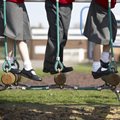The High Court recently highlighted the complexities of loss of income claims for traditional healers in personal injury cases. In Tjiane v Road Accident Fund [2024], the court decided on a case where a traditional healer sustained multiple injuries following a motor vehicle accident, resulting in a significant reduction in his earning capacity. This court illustrated important legal principles used to determine compensation for loss of income for professions reliant on physical capabilities, specifically traditional healers.

Image source: Natallia Khlapushyna –
123RF.comThe facts
The plaintiff, a traditional healer, used to earn R7,000 per month before the accident which occurred on 7 April 2018. The accident left him with multiple injuries and psychological trauma including a soft tissue back injury, a soft tissue right knee injury, a buttocks injury, and symptoms of PTSD. Due to his pre-existing visual impairment, the plaintiff relied on assistance to perform his duties.
However, after the accident, his monthly income reduced to R4,500 as he could no longer maintain the same workload, seeing fewer patients and needing to take rest breaks. As a result, his assistant was also no longer able to regularly assist him due to his reduced capacity and income.
The assessment of physical and psychological impairments
The court considered the impact of both plaintiff’s physical and psychological impairments. The physical injuries made it difficult to carry out his traditional healer duties, such as climbing mountains, gathering herbs from the mountains, kneeling, and standing for long periods. Furthermore, his PTSD and depression, exacerbated his inability to work effectively.
The plaintiff had appointed various medical experts, to accurately determine the extent of his injuries and to quantify his claim. The experts played a crucial role in showing how the accident-related injuries affected the plaintiff’s ability to perform traditional healing duties, causing a significant decline in his income.
Expert opinion
- According to the expert opinion of the psychiatrist, the plaintiff’s emotional and psychological state significantly affected his ability to conduct lengthy sessions with patients.
- After the accident, the plaintiff could no longer collect herbs or perform physically demanding rituals, which resulted in a decrease in his income. The occupational therapist stated that the plaintiff could continue with light work as a traditional healer.
- The industrial psychologist postulated the pre-accident earnings at R84,000 annually and post-accident earnings at R54,000 annually and recommended an appropriate contingency deduction to accommodate the increased risk of further loss of earnings.
The court's ruling
The court’s ruling took into account the plaintiff’s physical and psychiatric impairments when calculating the loss of income. It focused on fact that the plaintiff could not return to his work as a traditional healer at full capacity after the accident, which reduced his pre-accident income.
The defendant argued for a 25% pre-morbid contingency deduction due to the plaintiff's visual impairment and other uncertainties, which the court deemed as too high and ultimately settled on a pre-morbid future income contingency deduction of 15% to also make provision for uncertainties relating to his income. The court awarded a total loss of R1,062,887, divided into R263,693 allocated for past loss of earnings and R799,194 for future loss of earnings. The court acknowledged the plaintiff’s long-term dependency on assistance, the impact of physical pain on his performance, and the psychological difficulties that limit his workability.
Conclusion
In summary, this case provides insight into how courts assess the impact of loss of income for professionals, such as traditional healers, whose work involves physical labour. Expert opinion is important in assessing the extent of the loss and determining appropriate compensation for victims.































